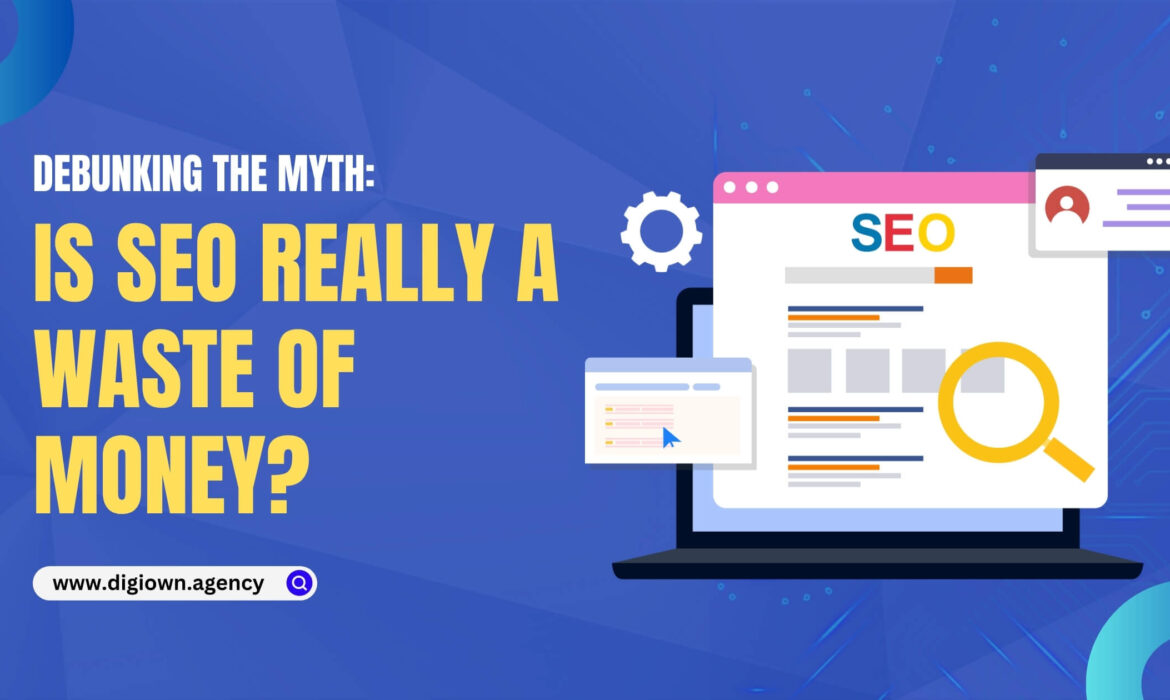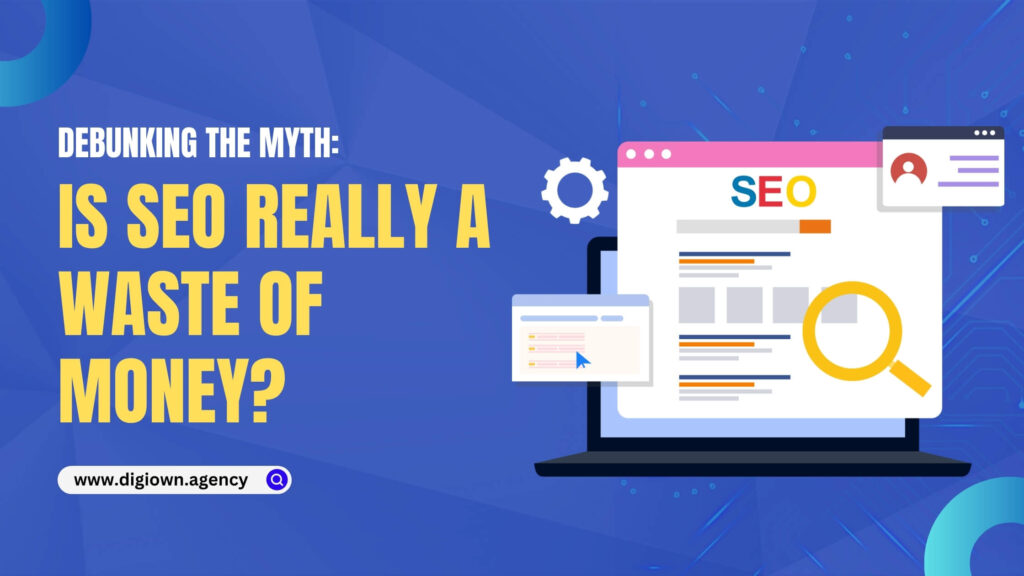

Is SEO a waste of money? This question pops up frequently in business discussions, particularly among those who have yet to experience the transformative power of search engine optimization. SEO, or Search Engine Optimization, has been a staple in digital marketing for years, yet its value is often misunderstood. According to a survey by BrightEdge, organic search drives 53.3% of all website traffic, making SEO a critical component of any digital strategy. In this article, we’ll debunk the myth that SEO is a waste of money by diving deep into its mechanics, addressing common misconceptions, showcasing success stories, and providing insights on ensuring SEO success.
Table of Contents
Understanding SEO
What is SEO?
SEO, or Search Engine Optimization, is the practice of optimizing a website to improve its visibility on search engines like Google. The main components of SEO include:
- On-page SEO: This involves optimizing individual web pages to rank higher and earn more relevant traffic. Key elements include content quality, keyword usage, and meta tags.
- Off-page SEO: This focuses on building a website’s reputation through backlinks from other credible sites.
- Technical SEO: This ensures that a website meets the technical requirements of search engines, such as site speed, mobile-friendliness, and secure connections (HTTPS).
How SEO Works
Search engines use complex algorithms to rank websites based on relevance and quality. These algorithms consider hundreds of factors, but some of the most important include:
- Keywords: Terms that users enter into search engines. Properly optimizing for relevant keywords is crucial.
- Content: High-quality, informative, and engaging content is essential for attracting and retaining visitors.
- Backlinks: Links from other websites serve as endorsements for your content’s quality.
- User Experience: Elements like site speed, mobile-friendliness, and secure browsing contribute significantly to rankings.
Common Misconceptions About SEO
Immediate Results Fallacy
One of the biggest misconceptions about SEO is the expectation of immediate results. Unlike paid advertising, SEO is a long-term strategy. It can take several months to see significant improvements in rankings and traffic. A study by Ahrefs found that only 5.7% of newly published pages will get to Google’s Top 10 within a year.
SEO is a One-Time Task
SEO is not a one-and-done task. Search algorithms constantly evolve, and so should your SEO strategies. Regular updates to content, ongoing link-building efforts, and continuous technical audits are necessary to maintain and improve rankings.
SEO Guarantees Top Ranking
No one can guarantee a #1 spot on Google. Search rankings are determined by many factors, including competition and changes in algorithms. Promises of guaranteed top rankings are often unrealistic and a red flag when choosing an SEO provider.
The Value of SEO
Long-Term Benefits
SEO offers sustainable traffic growth. Once your site ranks well, it can maintain its position with less ongoing effort compared to paid advertising, which stops driving traffic once you stop paying. This can lead to a consistent stream of visitors and potential customers.
Cost-Effectiveness
SEO can be more cost-effective than other marketing strategies. While it requires an initial investment, the long-term benefits can significantly outweigh the costs. For example, a HubSpot report found that inbound marketing (which includes SEO) costs 61% less per lead than outbound marketing (e.g., paid ads).
Case Studies and Success Stories
Case Study 1: Small Business Success
Consider a small e-commerce store specializing in handmade crafts. Initially, the site had minimal traffic and few sales. After investing in SEO, focusing on keyword optimization and content creation, the store saw a 150% increase in organic traffic within six months. This translated to a 200% increase in sales, demonstrating the power of a well-executed SEO strategy.
Case Study 2: Major Brand Improvement
A major retailer revamped its SEO strategy by improving site speed, optimizing mobile experience, and enhancing content quality. Within a year, the retailer saw a 300% increase in organic traffic and a 250% increase in revenue from organic searches. This case highlights how even established brands can benefit immensely from investing in SEO.
Key Takeaways
These case studies illustrate that SEO, when done correctly, can yield significant returns, making it far from a waste of money.
When SEO Might Seem Like a Waste of Money
Poor Strategy and Execution
SEO can seem like a waste of money if not executed properly. Common mistakes include keyword stuffing, low-quality content, and neglecting technical SEO aspects. These errors can lead to poor rankings and wasted resources.
Unrealistic Expectations
Setting unrealistic expectations, such as expecting immediate results or guaranteed top rankings, can lead to disappointment. Understanding that SEO is a long-term investment is crucial for measuring its success.
Lack of Proper Measurement
Without proper tracking and analytics, it’s challenging to see the full impact of SEO efforts. Tools like Google Analytics and SEMrush can help monitor progress and adjust strategies accordingly.
Ensuring SEO Success
Choosing the Right SEO Partner
Selecting a reputable SEO agency or consultant is crucial. Look for providers with proven track records, transparent practices, and realistic promises. For instance, Digiown offers tailored SEO strategies that align with specific business goals and needs.
Developing a Solid SEO Strategy
A successful SEO strategy should include comprehensive keyword research, high-quality content creation, ongoing link-building efforts, and regular technical audits. For insights into comprehensive SEO approaches, you can refer to Digiown’s SEO Audit Services.
Continuous Monitoring and Adjustment
SEO is an ongoing process. Regularly monitor your site’s performance, keep up with algorithm updates, and adjust your strategy as needed to stay ahead of the competition. For businesses looking to maintain and improve their SEO efforts, exploring services like Digiown’s Page Speed Optimization can be beneficial.
Conclusion
SEO is far from a waste of money. It is a valuable investment that can drive sustainable traffic, increase brand visibility, and ultimately boost revenue. By understanding its mechanics, addressing common misconceptions, and implementing effective strategies, businesses can harness the power of SEO to achieve long-term success.
Additional Resources
Recommended Reading
- “The Art of SEO” by Eric Enge, Stephan Spencer, and Jessie Stricchiola
- “SEO 2024” by Adam Clarke
Tools and Software
SEO Communities and Forums
By investing wisely in SEO and staying informed about best practices and industry trends, businesses can ensure they are not wasting money but rather investing in a powerful tool for growth and success.
For more details on professional SEO services, you can visit the SEO Services page on the Digiown website.






